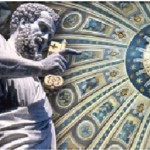 When the apostles were sent forth on their first mission, Jesus told them:
When the apostles were sent forth on their first mission, Jesus told them:
Teach that man’s whole duty is summed up in this one commandment: Love the Lord your God with all your mind and soul and your neighbor as yourself. [Paper 163:4.8, page 1805:5]
This seems like a very simple instruction, but it is really not. It is one thing to tell people your story, to share with them what you know; it is another thing to inspire them to develop a passion for loving God and others through what you say and do. This is essentially what Jesus was asking the disciples to do.
What this tells me is that the art of teaching truth is not so much about how skillfully we are delivering knowledge, a skill that can be learned. To me the art of teaching embraces how truthfully we are reflecting in our lives the essence of what we teach. I don’t remember one fact of what my third grade teacher taught me, but I know she instilled in me a passion for learning.
The quality of our decisions and actions reflect the accuracy of the worldview that guides our lives. A look at the violence that prevails in the world, most between so-called religious people, informs us that current worldviews are in dire need of expanded spiritual truths. The Urantia Book provides humanity with fresh new concepts that fill the gaps in our religious worldviews and goes on to expand and uplift them. A comprehensive and consistent universe perspective has the potential to elevate and harmonize the fragmented world philosophies to elevate the quality of individual decisions and actions. The question is: How effectively are we readers contributing towards this end?
To be effective students of The Urantia Book is to experience the passion that comes from truly accepting it as the Fifth Epochal Revelation. It is to enliven The Urantia Book’s potential to break through philosophic chaos and spiritual stagnation. To achieve this we cannot cherry-pick chosen concepts from The Urantia Book that resonate with us and adjust them to our philosophy of religion. We must instead commit to the challenging journey of adjusting our philosophy of religion to the cosmic truths presented in The Urantia Book.
Cherry-picking will continue the fragmentation in the world because essentially we are not doing anything different than previous generations. If we choose to embrace the challenge The Urantia Book presents, then slowly but surely the world will begin to reflect the peace and progress that comes from decisions and actions that are guided by an increasingly logical and comprehensive perspective of the universe that can be shared by all.

Teaching Truth- Holding the Key of Knowledge
Jesus had a complete perspective of the universe, and it is this fact that separates Jesus from all other religious leaders before and since his bestowal on earth. Jesus knew and loved the Universal Father. He knew the Father’s personality and, while he could not explain it to the people of the time, he could reveal his Father’s attributes in everything he said and did. Jesus knew the difference between soul and spirit; he knew about the heavens and the vast celestial hierarchy; he knew that the universe was immense and complex, but he could not explain it to the simplistic minds of those days. Having this complete perspective nourished Jesus’ desire to do the father’s will—to develop himself that he may better serve others. He took every opportunity to learn and grow. This complete perspective as a young man enabled him to appreciate truth and recognize error as he perused the pages of the ancient Book of Enoch. It was this complete perspective that enabled him to be grounded among his critics and not be swayed by his disciples when they talked about reincarnation, a popular concept at the time. The harmony of truth which Jesus exuded in everything he said and did continues to inspire people today to be the best they can be.
How then can we begin to develop the capacity to live truth as Jesus did, that we too may inspire others to be the best they can be; to grow in their love of God and others? Below are some suggestions:
- Explore rather than discard those concepts in The Urantia Book that challenge you. Be willing to adjust your philosophy of religion to align with that presented in The Urantia Book.
- Challenge your comfort zones: The religion of the spirit means effort, struggle, conflict, faith, determination, love, loyalty, and progress. [Paper 155:5.11, page 1729.6]
- Exercise flexibility without judgment. Listen to the perspective of others and control the urge to preach or lecture.
- Recognize first that true wisdom is accompanied by humility—the recognition that you have much to learn. Second, true wisdom cultivates a growing appreciation and love of God, which reflects in your relationships.
- When making a decision, ask yourself: “Will it bring me closer to God and God closer to me?” This self inquiry will uplift your thinking so that your actions will increasingly reflect the “best way” of doing things.
Teaching what we know promotes personal growth; living truth promotes peace and social progress. The art of teaching is revealed in the integration of both.
